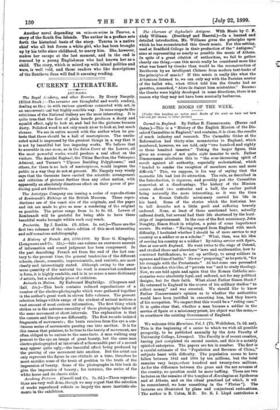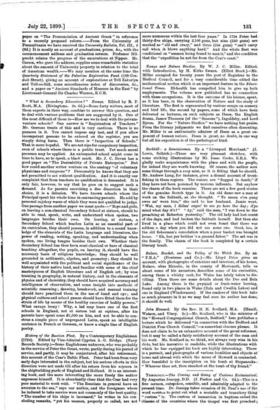We welcome Wirt Merseiana, Vol. I. (Th. Wohlleben, 7s. Gd.
net). This is the beginning of a series to which we wish all possible prosperity, to be published annually by the Arts Faculty of University College, Liverpool. The Faculty is of recent creation, having just completed its second session, and this is a notably spirited enterprise. The papers are ten in number. The first is a careful estimate of the "Population and Revenue of China," subjects beset with difficulty. The population seems to have fallen between 1842 and 1894 by ten millions, but the total remains very large,—four hundred and twenty-two millions. As for the difference between the gross and the net revenue of the country, no question could be more baffling. There are two lectures on the remains of the temples of ./Esculapius at Epidaurus and at Athens, and on the ritual practised (of which, it wil be remembered, we hear something in the " Plutns "). The lectures are illustrated by plans and conjectural restorations. The author is R. Caton, M.D. Dr. R. I. Lloyd contributes a paper on "The Pronunciation of Ancient Greek" in reference to a recently proposed reform—From the University of Pennsylvania we have received the University Bulletin, Vol. III., 9 (8d.) It is mostly an account of graduations, prizes, &c:, with the commencement address and graduation sermon. Professor RH- precht relates the progress of the excavations at Nippur. Mr. Carson, who gave tha. address, supplies some remarkable statistics about the amount of University property in relation to the total of American wealth.—We may mention at the same time the Quarterly Statement of the Palestine Exploration Fund (138 Con- duit Street), giving an account of explorations at Tell Zakariya and Tell-es-Silfi, some miscellaneous notes of discoveries, &c., and a paper on "Ancient Standards of Measure in the East" by Lieutenant-General Sir Charles Warren, K.C.B.



































 Previous page
Previous page